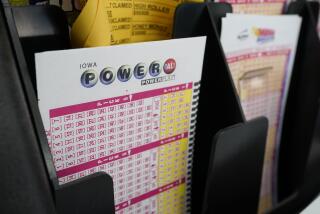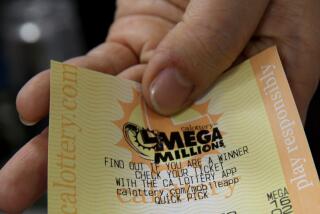State’s Lottery ‘Millionaires’ Will Be Somewhat Less Than
When the California lottery gets into full swing this fall, it will offer jackpots of $1 million, $2 million and $3 million. The lucky winners, therefore, will be “millionaires,” according to common parlance.
Not so fast. There’s a rub. “All million-dollar prizes will be awarded as annuities over a 20-year period,” said an article in The Times. In other words, if you win, say, a million dollars, the Lottery Commission won’t hand you a check for a million. It will pay you $50,000 now and promise to pay another $50,000 a year for 19 more years, for a total of $1 million.
Now, $50,000 a year for 20 years is not worth a million dollars by a long shot. In fact, according to Bill Seaton, spokesman for the Lottery Commission, if you win “a million dollars” in the lottery, what they actually will give you is not a million dollars but an annuity worth $400,000 today.
A $400,000 annuity winds up being worth $1 million over 20 years because of the miracle of compound interest. Think about it. Money that is put aside today earns interest and is worth more in the future. The longer the future is, the more it grows.
So if the state promises to pay you $50,000 19 years from now--the time of the last payment--how much does it have to put aside today in order to have the $50,000 then? It depends, obviously, on the interest rate. The higher the interest rate, the less that has to be set aside initially. If it earns 8%, $11,585.60 will yield $50,000 in 19 years. At a 10% rate, $8,175.40 will grow to $50,000 in 19 years. And at 12%, it would take just $5,805.34 today to produce $50,000 in 2004.
This is a well-known bit of straightforward mathematics, which is called the present-value or present-worth calculation. It involves running the formula for compound interest backward, and it answers the question, “What is the present value of a future sum of money?” Everybody understands that if a person invested $1,000 today at 10% interest it would earn $100 in a year and then be worth $1,100. The question can be asked the other way: If you wind up with $1,100 in a year at 10% interest, how much did you start with? The answer is $1,000, and that is called the present value of $1,100 in a year at 10% interest.
Occasionally, when athletes sign multiyear, multimillion-dollar contracts, someone points out that an owner who promises to pay $2 million 30 years from now can do it with much less than $2 million today.
How does the lottery figure the present value of $1 million doled out in 20-year installments of $50,000 a year? The same calculation that is done for year 19--the last year--can also be done for years 18, 17, 16 and so on to determine the amount of money that must be set aside today to pay the $50,000 in each of the subsequent years. Then those present values can be added to yield the total present value of the state’s “million-dollar lottery.” The following is a table showing the present values of 20 once-a-year payments of $50,000 each, assuming earnings of 12.8%:
Year Payment Present value 0 $50,000 $50,000.00 1 50,000 44,326.24 2 50,000 39,296.31 3 50,000 34,837.16 4 50,000 30,884.00 5 50,000 27,379.44 6 50,000 24,272.55 7 50,000 21,518.22 8 50,000 19,076.43 9 50,000 16,911.73 10 50,000 14,992.67 11 50,000 13,291.38 12 50,000 11,783.13 13 50,000 10,446.04 14 50,000 9,260.67 15 50,000 8,209.82 16 50,000 7,278.21 17 50,000 6,452.31 18 50,000 5,720.13 19 50,000 5,071.04
The total present value of $1 million handed out in $50,000 chunks over 20 years is $401,007.48.
So it is at least misleading to call $50,000 a year for 20 years “a million dollars.” (This analysis ignores income tax, inflation, life expectancy and all other factors related to the question of which is the better deal, $400,000 today or $50,000 a year for 20 years.)
The Lottery Commission says further that, based on the same calculation, a winner of a $2-million jackpot will receive an $800,000 annuity. In addition, the commission says, the odds against winning a $2-million pot are 25 million to 1.
So a person who buys a $1 ticket will have a 25 million-to-1 shot at winning a “$2-million” prize. That sounds like bad odds to begin with. The odds are made worse by the fact that the $2-million prize is really only $800,000.
More to Read
Sign up for Essential California
The most important California stories and recommendations in your inbox every morning.
You may occasionally receive promotional content from the Los Angeles Times.









